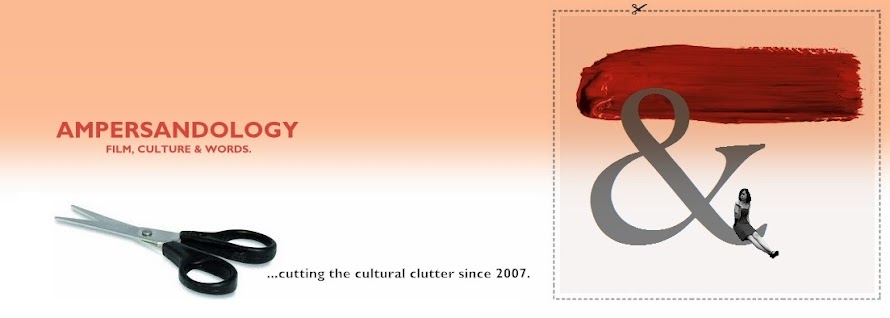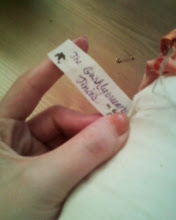by Jillian Butler, Ampersandology
I think we all have a moment, if we're cut from a certain cloth, when we realize as adults that we didn't turn out like the other kids. Full disclosure: I have had several, if not dozens of these moments.
This is the story of the most recent.
*
This Christmas, I was given a sewing machine by Bug, a terribly thoughtful gift to feed the fires of my love for fashion. I just picked it up this weekend and, in my typical learning curve, immediately dove into a project way too advanced for my skill level. Without hubris, I ponder earnestly, would I ever learn anything?
The first of these projects was a doll for my cousin, who I adore. It's fairly straightforward, and so fun to design. But did I chose a princess? No.
Did I choose a classic character from children's literature? Oh, no no no.
I choose to make my 3 year old cousin a doll, made with my loving intentions, depicting one of the 26 children who meet their untimely demise in Edward Gorey's The Gashlycrumb Tinies. I picked Una!
It's my favorite Gorey book, and I read the tale of dancing with the afterlife in (told in rhyming dactylic couplets) when I was, oh, say seven? I think I found it at Granny Bates, on a high shelf. Gorey drew his famous illustrations with a stern Victorian whimsy which, yeah, seems like an oxymoron until you see his work. He plays with ideas of moral instruction, strange comforts of the macabre and dark and sinister ideas of the familiar domicile.
Anyway. The doll is almost finished. I hope she likes my Gothic little friend! I even made a little tag so that when my cousin gets older and grows a sense of humor, we can bond over the delights of the macabre. Una the doll has no hair right now, but she does have the blankest, most dour expression. Place your orders now---I might sew up all 26.
Have a suggestion for a future Ampersandology topic? Got something you’d like to say? All feedback welcome! Shoot us an email at ampersandology@gmail.com, or follow Ampersandology on Facebook.
I think we all have a moment, if we're cut from a certain cloth, when we realize as adults that we didn't turn out like the other kids. Full disclosure: I have had several, if not dozens of these moments.
This is the story of the most recent.
*
This Christmas, I was given a sewing machine by Bug, a terribly thoughtful gift to feed the fires of my love for fashion. I just picked it up this weekend and, in my typical learning curve, immediately dove into a project way too advanced for my skill level. Without hubris, I ponder earnestly, would I ever learn anything?
The first of these projects was a doll for my cousin, who I adore. It's fairly straightforward, and so fun to design. But did I chose a princess? No.
Did I choose a classic character from children's literature? Oh, no no no.
I choose to make my 3 year old cousin a doll, made with my loving intentions, depicting one of the 26 children who meet their untimely demise in Edward Gorey's The Gashlycrumb Tinies. I picked Una!
It's my favorite Gorey book, and I read the tale of dancing with the afterlife in (told in rhyming dactylic couplets) when I was, oh, say seven? I think I found it at Granny Bates, on a high shelf. Gorey drew his famous illustrations with a stern Victorian whimsy which, yeah, seems like an oxymoron until you see his work. He plays with ideas of moral instruction, strange comforts of the macabre and dark and sinister ideas of the familiar domicile.
Gorey played this mild terror straight and for the same resons I read and love Roald Dahl, spared no unfortunate circumstance for his young (or possibly not so young) readers. He said, "Sunny, funny nonsense for children — oh, how boring, boring, boring. As Schubert said, there is no happy music. And that's true, there really isn't. And there's probably no happy nonsense, either." For that, Edward Gorey is one of my secret obsessions. He's dark and weaves a similar tapestry of childhood, which I've always looked back on as a Gothic, vaguely sinister time, full of half-understood languages and inherited secrets.
Anyway. The doll is almost finished. I hope she likes my Gothic little friend! I even made a little tag so that when my cousin gets older and grows a sense of humor, we can bond over the delights of the macabre. Una the doll has no hair right now, but she does have the blankest, most dour expression. Place your orders now---I might sew up all 26.
Have a suggestion for a future Ampersandology topic? Got something you’d like to say? All feedback welcome! Shoot us an email at ampersandology@gmail.com, or follow Ampersandology on Facebook.




